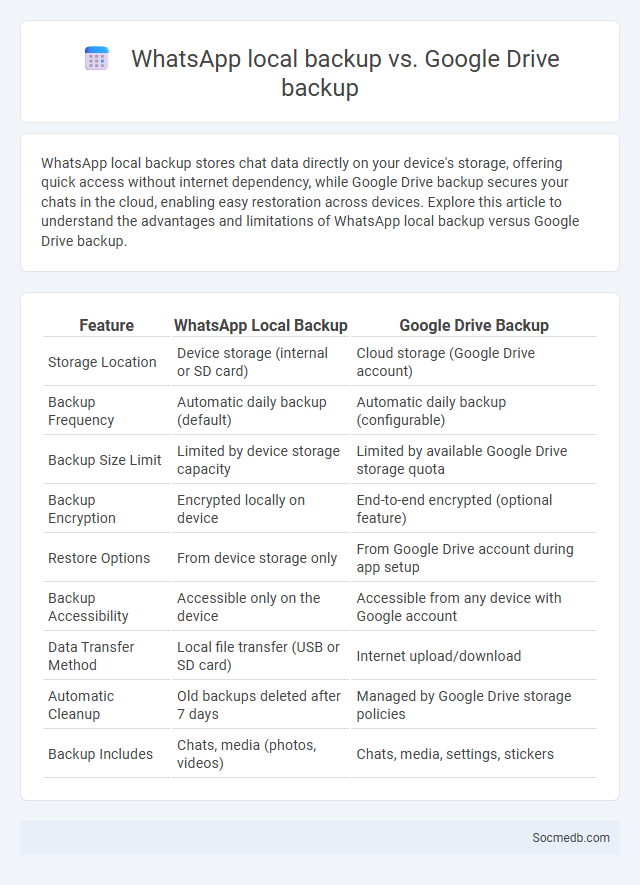
Photo illustration: WhatsApp local backup vs Google Drive backup
WhatsApp local backup stores chat data directly on your device's storage, offering quick access without internet dependency, while Google Drive backup secures your chats in the cloud, enabling easy restoration across devices. Explore this article to understand the advantages and limitations of WhatsApp local backup versus Google Drive backup.
Table of Comparison
| Feature | WhatsApp Local Backup | Google Drive Backup |
|---|---|---|
| Storage Location | Device storage (internal or SD card) | Cloud storage (Google Drive account) |
| Backup Frequency | Automatic daily backup (default) | Automatic daily backup (configurable) |
| Backup Size Limit | Limited by device storage capacity | Limited by available Google Drive storage quota |
| Backup Encryption | Encrypted locally on device | End-to-end encrypted (optional feature) |
| Restore Options | From device storage only | From Google Drive account during app setup |
| Backup Accessibility | Accessible only on the device | Accessible from any device with Google account |
| Data Transfer Method | Local file transfer (USB or SD card) | Internet upload/download |
| Automatic Cleanup | Old backups deleted after 7 days | Managed by Google Drive storage policies |
| Backup Includes | Chats, media (photos, videos) | Chats, media, settings, stickers |
Introduction to WhatsApp Backup Options
WhatsApp offers several backup options to protect your chat history and media files, including local backups on your device and cloud backups via Google Drive for Android or iCloud for iOS. You can customize your backup settings to schedule automatic backups daily, weekly, or monthly, ensuring that your important conversations are securely saved. Understanding these options helps you keep your WhatsApp data safe and easily recoverable in case you switch devices or experience data loss.
What is WhatsApp Local Backup?
WhatsApp Local Backup is a feature that automatically saves chat history and media files directly to a user's device, typically within the phone's internal storage or SD card. These backups are created daily at a specific time and stored in a folder accessible through file managers, allowing users to restore messages without requiring internet access. Local backups provide a quick, offline method to recover conversations if WhatsApp is reinstalled or the phone is switched.
What is WhatsApp Google Drive Backup?
WhatsApp Google Drive Backup is a cloud storage feature that allows users to securely save their chat history, photos, videos, and voice messages from WhatsApp on their Google Drive account. This backup ensures data recovery in case of phone loss, damage, or app reinstallation, maintaining message continuity across devices. Users can schedule automatic backups daily, weekly, or monthly, optimizing data safety and storage management within Google Drive's free or paid space limits.
Understanding WhatsApp Chat Backup
WhatsApp chat backup is crucial for protecting your conversations and media files from loss due to phone damage or switching devices. Your chat history, including text messages, images, and videos, is securely stored in cloud services like Google Drive for Android or iCloud for iOS, enabling easy restoration. Understanding the backup frequency options and storage limits ensures your WhatsApp data is consistently and effectively saved.
Key Differences: Local vs Google Drive vs Chat Backup
Google Drive offers cloud-based storage optimized for large files and cross-device synchronization, while Local backups save data directly on your device, providing quick access without internet dependency but limited by device storage. Chat Backup systems prioritize message history restoration within specific apps, ensuring seamless recovery of conversations to maintain continuity. Selecting the right option depends on Your need for accessibility, storage capacity, and backup reliability.
Backup Security and Privacy Comparison
Social media platforms differ significantly in their backup security and privacy measures, with end-to-end encryption being the strongest safeguard against data breaches. Facebook and Instagram store user data on centralized servers with regular backups, but are frequently scrutinized for privacy vulnerabilities. In contrast, platforms like Signal and Telegram emphasize encrypted backups and minimal data retention, offering enhanced protection for personal information and user privacy.
Storage Capacity and Limitations
Social media platforms offer varying storage capacities for user-generated content, with popular sites like Instagram allowing up to 4,000 photo uploads per account and TikTok supporting videos up to 10 minutes in length, balancing quality and server limitations. Your ability to store and share content may be constrained by platform-specific file size limits, such as Twitter's 5MB image limit and 512MB for videos, requiring efficient management of your digital assets. Understanding these storage restrictions helps optimize your social media experience by ensuring that your posts maintain quality without exceeding platform thresholds.
Data Recovery: Local Backup vs Google Drive
Data recovery for social media content hinges on the choice between local backup and Google Drive, with local backups offering faster restoration and greater control over data security. Google Drive provides automatic cloud synchronization, enabling easy access and recovery across devices but may depend on internet connectivity and storage limits. Optimal recovery strategies combine regular local backups with Google Drive synchronization to ensure redundancy and minimize data loss risks.
Choosing the Best WhatsApp Backup Method
Choosing the best WhatsApp backup method depends on factors like storage capacity, device compatibility, and data security preferences. Google Drive and iCloud are popular cloud-based options that offer automatic backups with encryption, ensuring your chats and media are safely stored without occupying local storage. You should evaluate your available space, desired backup frequency, and whether you prefer local or cloud storage to protect your WhatsApp conversations effectively.
Frequently Asked Questions About WhatsApp Backup
WhatsApp backup frequently asked questions often revolve around data security, storage locations, and restoration processes. Users commonly inquire about how to back up chat history to Google Drive or iCloud, the frequency of automatic backups, and steps to retrieve messages after switching devices. Your understanding of backup options ensures seamless recovery of conversations and media without data loss.
 socmedb.com
socmedb.com